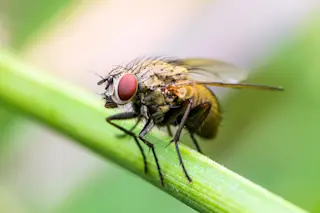Without those eight or so hours of precious shut-eye, many of us feel dazed, sluggish and downright useless. Sleep might be thought of as the great equalizer — birds do it, bees do it, every animal with a brain does it. But a new study suggests that might not be quite right after all.
A study published today in the journal Science Advances found that some members of a species of fruit fly could, to the jealousy of humans, function on practically no sleep. After being kept awake for several days, their health and energy levels were as high as ever, and overall lifespans remained the same. And when left to their own devices, one fly snoozed for mere minutes a day, living a virtually sleepless life. The discovery, which marks the first time a near-sleepless animal species has been identified, is causing researchers to question our need to sleep.
...














